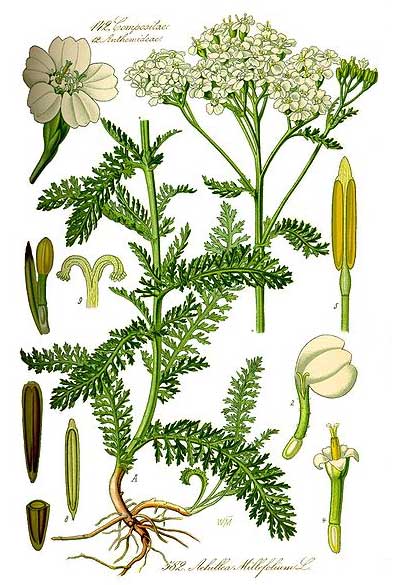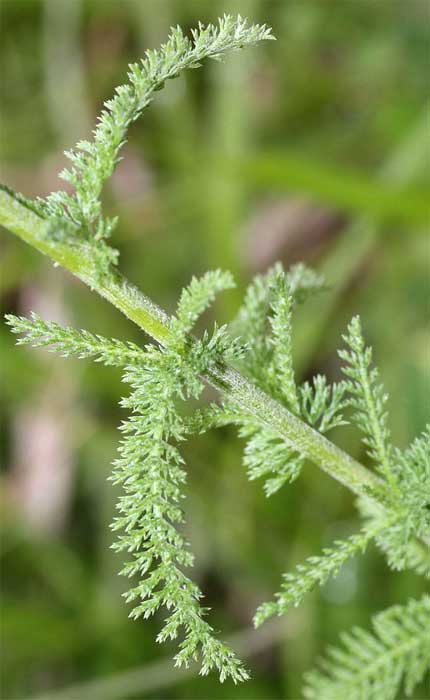Yarrow in herbal medicine
Yarrow (Achillea millefolium) is a common plant with very useful properties. When applied to a fresh wound, yarrow causes blood to clot.

A dab of dried, powdered yarrow leaf is better than toilet paper for shaving nicks. Keep a little in the bathroom and apply with cotton swabs when needed.
Yarrow has been known to save lives in emergency hunting accidents and other traumatic situations. When taken internally, yarrow promotes a healthy circulatory system and is a tonic for the nerves.

Yarrow nourishes the urinary tract and digestive system.
Yarrow is a very astringent medicinal herb.
Yarrow promotes sweating, relaxes peripheral blood vessels, lowers blood pressure, restores menstrual periods, treats varicose veins, improves nutrient absorption, opens sweat glands, conditions the scalp, and tones the skin.
It also stops nose bleeds, helps reduce fever, cools hot flashes, and helps heal bladder infections.
Use yarrow internally and externally.
Yarrow may be used externally as a poultice, compress, or wash. It may be taken internally as a tea, tincture, or capsule.
Use yarrow infusion in an herbal bath to lessen menstrual cramps.
Do not take yarrow essential oil by mouth or internally.
Yarrow is also distilled into an essential oil.
The essential oil of yarrow is anti-inflammatory, anti-allergenic, and anti-spasmodic (relaxes cramps).
Yarrow essential oil is often used in aromatherapy and massage.
It is a rare dark blue in color (most essential oils are clear, yellow or gold).
Always dilute essential oils before use! Essential oils are powerful medicines and can cause harm if used incorrectly. A few drops goes a long way.
Yarrow essential oil is an excellent addition to chest rubs.
Combine with eucalyptus, peppermint, hyssop, and rosemary essential oils for best results.
Yarrow essential oil and olive oil recipe
Use this blend to sooth congestion, sore throat, and coughs. Mix one tablespoon of olive oil, 2 drops of yarrow essential oil, and a few drops of either peppermint, hyssop, or rosemary essential oil. Gently rub on the throat, neck, shoulders, and chest. This mix also helps stop pain from sore muscles and joints.
Besides simple oil blends, you can also use yarrow essential oil to make ointment.
Yarrow ointments are easy to make at home.
- Mix a small piece of beeswax (about 2 teaspoons) with a quarter cup of olive oil.
- Heat in double boiler until wax is melted.
- Watch carefully and stir often. Do not let it smoke or you will have to start over!
- Remove from heat as soon as the wax is melted. Keep stirring. It will thicken as it cools.
- Add a couple drops of yarrow essential oil.
- Stir gently and pour into a tightly sealed container before the ointment "sets" up. It will be soft like jelly, or harder like lipstick, depending on your ratio of wax to oil.
Read more about making herbal products at home.
Science, yarrow, and healing
Yarrow has been used since ancient times to treat wounds, headache, inflammation, pain, gas, and more.
Yarrow has many medical properties. It contains powerful flavonoids, phenolic acids, coumarins, terpenoids, and sterols that work to heal our bodies.
Yarrow is proven useful when treating ulcers, stimulating immunity, and fighting harmful organisms.
Yarrow is included in the national pharmacopoeias including Germany, Czech Republic, France, and Switzerland.
In Spanish, yarrow is called plumajillo or "little feather". In Persia, yarrow is known as Bumadaran. No matter the name, yarrow is useful and a well-known medicinal herb around the world.
Yarrow and obesity
Yarrow supercritical fluid extract (Yarrow SFE) improves fasting glucose levels, increases insulin sensitivity, and protects the liver from high fat diets. Studies are underway to see how yarrow benefits people that are obese. I can't wait to see the results.
Yarrow flowers are rich in anti-allergenic compounds.
The flowers are used for mucus problems, including hay fever, colds and flu.
Flowers should be harvested in late summer and early fall. Dry for winter use and store in a cool, dark place.

Yarrow grows wild in the North Georgia Mountains.
Yarrow is found in pastures, meadows, and along the roadways.
Yarrow plants are downy, aromatic, and produce flat-headed white, beige, or pinkish flowers.
Yarrow is a perennial that grows from eighteen inches to five foot tall.
The plant is hardy and prefers well drained soil with full sun. Propagate by division.
*Always discard any herbal product if mold appears. Yarrow essential oil should be mixed with carrier oil before coming in contact with skin. Do NOT use yarrow during pregnancy. In rare instances, handling yarrow flowers and plants can cause skin rash.
Always consult with a healthcare professional before using any herbal remedy especially if pregnant, nursing, or using any other medicine.
Sources:
https://www.ncbi.nlm.nih.gov/pmc/articles/PMC3232110/
https://www.ncbi.nlm.nih.gov/pmc/articles/PMC7019615/
Blessings to you and yours!
Thanks so much for reading my blog. Jan.

*Note - the information on this website has not been evaluated by the Food and Drug Administration.
© 2005-2024 website design and content by Janice Boling